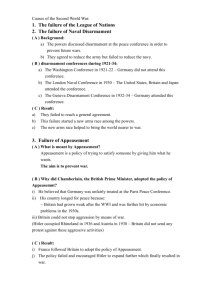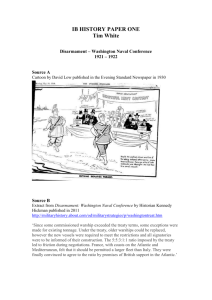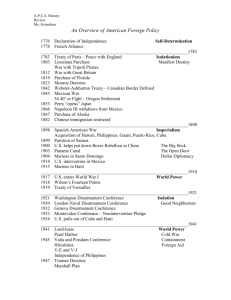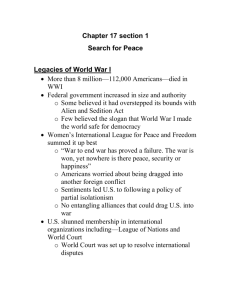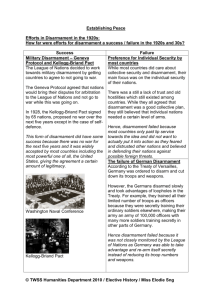Disarmament
advertisement
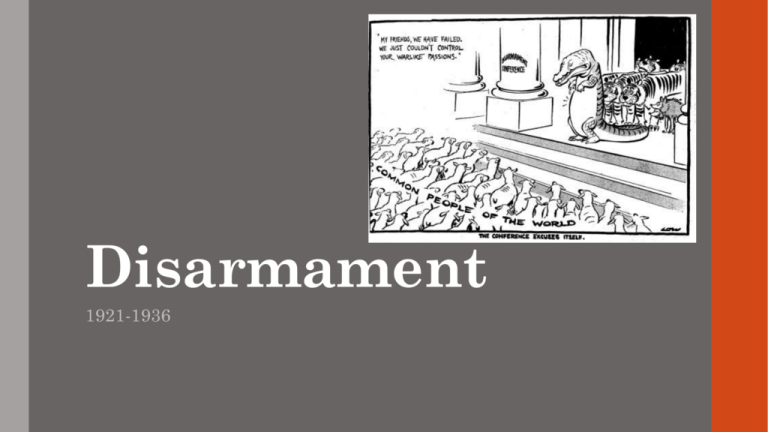
Disarmament 1921-1936 Washington Naval Conference (1921) The conference was organized by the US and aimed at reducing naval armaments. The US, UK and Japan all actively built up naval fleets following WWI, but the UK and Japan couldn’t afford to continue the naval race and the US wanted to decrease spending. In addition, there was a need to reduce tension between Japan and US in Asia before it reached the state of international crisis. US Issues over territory in China and Philippines Worried about loss of trade relations in China bc of Japan UK Japan Didn’t want to threaten the alliance they had with Japan since 1902 Felt threatened by the US unwilling to recognize territorial gains and worried about naval build-up Feeling pressure to sign an alliance with US Washington Naval Conference (1921) Results of Conference: • Limited size/number of battleships, aircraft carriers and cruisers (ratio of 5:5:3) • No new battleships for 10 years • Limited construction of bases in the Pacific (this would give Japan dominance in the eastern Pacific) Successes: • There was short-term, limited success – mainly because in order to be successful they needed to address the reasons for the arms race before disarmament occurred • Issues included grievances, territorial claims, mistrust of neighboring nations • Many nations (Germany, Russia, Japan, Italy) would see rearmament as their only option • It was possible that these conferences encouraged aggression rather than discouraging it Washington Naval Conference (1921) While success was short-term and limited, it did further disarmament negotiations. It was seem by the public as a very positive step (people were very supportive of any form of disarmament following WWI). Much of this support was based on the following agreements: 4- Power Agreement: (US, Japan, UK, France) Replaced the Anglo-Japanese Alliance of 1902 and protected the Asian territorial rights of each nation. Agreed to defend each other in case of aggression. 9-Power Agreement: this confirmed the Open-Door Policy regarding trade in China (ended in 1931) These agreements temporarily reduced tension between the US and Japan, but depended entirely on the cooperation of each nation. They were vaguely worded and that it easy for a nation to back out if their interests changed. London Naval Conference (1930) Involved US, UK, Japan, Italy and France Made revisions to Washington agreement (10:10:7) Increased regulations on sub warfare until 1936 Nations were more willing to reduce arms Gov’t wanted to save money because of the Great Depression Public wasn’t supportive of spending $$ on military buildup London Naval Treaty (1936) Revision of London Agreement – failure (Japan and Italy walked out) Increasing issues with German and Japanese rearmament Geneva Disarmament Conference (1932-1934) Failure because: • There were major world issues regarding arms race (Germany was violating numerous terms of the Versailles Treaty) • There was international pressure to revise Paris Peace Settlement • Great Depression had reduced optimism (nations were worried about their own security and “collective security” wasn’t top priority) • Problems distinguishing between offensive and defensive weaponsundermined any real discussion at conference) • Germany used the conference as a way to show the hypocrisy of other countries (said either Germany should be allowed to build arms equal to that of other nations or others should reduce to Germany’s permitted strength) Geneva Disarmament Conference (1932-1934) Hitler left the conference in 1932, but returned in 1933. By this time he had become Chancellor of Germany. He had no real interest in diplomatic efforts – he withdrew from the conference, then from the League This allowed him the opportunity to openly start a rearmament plan – this worried France Geneva Disarmament Conference (1932-1934) In addition to German resistance at the conference, Italy also had issues with the disarmament process – Mussolini wanted to build an empire. No real agreements were made at the conference and tensions increased. Nations had two options on how to best protect themselves: 1. Increase defense spending and continue to build up their militaries 2. Attempt diplomatic negotiations regarding issues in order to avoid escalation As long as Germany, Russia, Italy and Japan were determined to revise the Paris Peace Settlements and recover lost territory, then there wasn’t much hope for arms reduction. Writing Prompt - Disarmament Answer the following questions regarding your opinions on ‘disarmament’ on a separate sheet of paper. 1. Do you believe there will always be reasons to have weapons? Why or why not? 2. How realistic is disarmament as a strategic objective? 3. Could international policies be put in place to limit the spread of weapons? What incentives do nations have to disarm and adhere to these policies?
